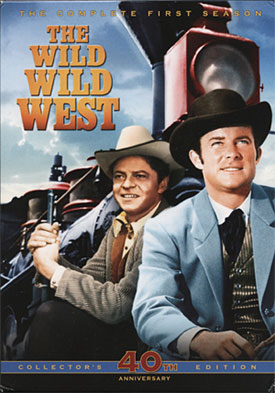

  |
|
|
||||||||||||||||||||||
|
FMS FEATURE... June 12, 2006 The Wild Wild West Scores! Composer Markowitz recognized, heard on new DVDs by Jon Burlingame  With his theme for The Wild Wild West, Richard Markowitz (1926-1994) created one of the 1960s most memorable television signatures. In fact, although he never reached the pinnacle of fame and fortune that Jerry Goldsmith and Earle Hagen did, Markowitz's Wild Wild West theme is probably more widely remembered by baby-boomers than Goldsmith's Man From U.N.C.L.E. and Hagen's I Spy themes. (And, it should be noted, West lasted longer than either of those other shows.) In 1965, CBS was eager to jump on the James Bond spy bandwagon. The 007 films were box-office smashes, NBC already had U.N.C.L.E. on the air and had commissioned I Spy. This new, exceedingly clever show was about spies in the 19th-century American frontier, and Robert Conrad and Ross Martin were undeniably brilliant casting as resourceful agents James West and Artemus Gordon. An aspect of the creation of a successful series that is rarely talked about – yet, as any producer will tell you, a critical element in audience acceptance and appreciation – is the music. CBS, which not only aired West but also produced it, had a creative stumble when it commissioned Rawhide composer Dimitri Tiomkin to write the theme for what was then called The Wild West. (See "Dimitri Tiomkin and The Wild Wild West: The Untold Story," posted on this site 8/30/04.) Luckily, Markowitz – who had enjoyed a minor hit with the theme from an earlier western series, The Rebel, sung by Johnny Cash – was ready with an alternate theme when he scored the pilot in January 1965. Producer Michael Garrison's rejection of the two proposed Tiomkin songs resulted in Markowitz winning the prize: theme and pilot score, from which much of the musical material of the first season would be derived. Which brings us back to the DVDs. Among the bonus features are two items that may be unprecedented in the presentation of classic TV on DVD: An archival audio interview with the composer, conducted by author Sue Kesler (The Wild Wild West: The Series, Arnett Press, 1988), and several minutes of the original scoring sessions for the theme and variations on the theme recorded by Markowitz in early 1965. The Markowitz segment runs nearly nine minutes, as the soft-spoken composer recalls that the original Tiomkin song "was very, kind of, traditional, it just seemed wrong," yet Tiomkin's threat to sue CBS, he claims, led to the network's failure to give Markowitz screen credit for the theme on shows that he didn't personally score. "They paid him 10 times as much [to walk away] as what they paid me just to write the score," he says. (Markowitz may have been wrong about the missing screen credit for his theme. Unlike the other networks, CBS often neglected to credit theme composers, probably the result of contractual oversights. Rex Koury was never credited during 20 years of Gunsmoke episodes, and neither Bernard Herrmann nor Marius Constant received theme credits on The Twilight Zone.) "By combining jazz with Americana, I think that's what nailed it," Markowitz explains in discussing his own approach. "That took it away from the serioso kind of thing that Tiomkin was trying to do... What I did essentially was write two themes: the rhythmic, contemporary theme, Fender bass and brushes, that vamp, for the cartoon effects and for West's getting himself out of trouble, and the heraldic western outdoor theme over that, so that the two worked together." Markowitz also mentions his original theme for Artemus Gordon; how much he enjoyed the Dr. Loveless episodes; and, quite candidly, the problems that he had with Morton Stevens, who later became head of the network's West Coast music department, which led to his being effectively fired from the series. The interview is a terrific addition to the first-season set – particularly as Markowitz's music set the tone for so much of the early part of the series, and this material puts it all in context. Several years ago, UCLA Special Collections acquired thousands of tapes from the CBS Music Department, and that was the source of the eight-plus minutes of great-sounding music from Markowitz's pilot scoring sessions in early 1965. Six pieces, including the theme and several variations, are included. It's a fascinating and all-too-short glimpse into what it must have been like to be present at a scoring session for The Wild Wild West. Other DVD sets have featured music segments, of course. Composer Michael Giacchino is interviewed on the Lost first-season set; the "definitive editions" of CBS's The Twilight Zone feature many "isolated scores," allowing fans to listen to the extraordinary music (some by Bernard Herrmann and Goldsmith) without being bothered by dialogue or sound effects. Veteran Hanna-Barbera composer Hoyt Curtin gets a tribute on The Flintstones Season 4 DVD set. But so many other classic TV DVDs have been issued without a mention of the music that is so important to our enjoyment of the shows, and such an indelible part of American popular culture. As for the episodes, Markowitz received screen credit on 19 of the 28 first-season shows but in fact composed just six original scores in that first season: "The Night of the Inferno" (the pilot), "The Night of Sudden Death," "The Night of a Thousand Eyes," "The Night of the Glowing Corpse," "The Night That Terror Stalked the Town" and "The Night of the Bars of Hell." Additional scores in the 1965-66 season were composed by Robert Drasnin (three), Harry Geller, Dave Grusin and Richard Shores (one each). The shows look – in glorious, mid-'60s black-and-white – and sound terrific. Forty years later, The Wild Wild West can be enjoyed again, thanks to DVDs that also pay homage to one of TV's forgotten musical geniuses: Richard Markowitz. ©2006 Jon Burlingame |
Search
Past Features
Feature Archives
|